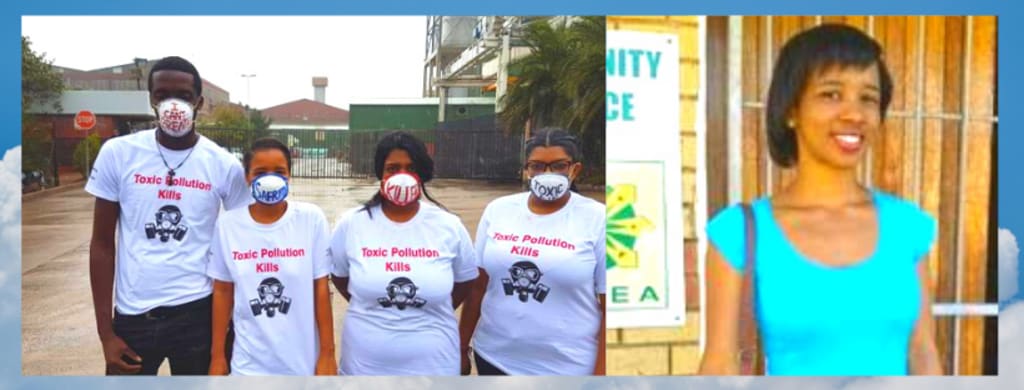Women Who Inspire: How My Environmental Justice and Civil Rights Activist Sister, Joanne Groom, Motivated Me
A Story of Community Justice Work and Education

While studying abroad for college in South Africa, I had the intentions of studying public health and learning about a post apartheid society. Little did I know that I would be meeting astounding women and would soon be among them--swept up in politics and boldly making differences in my own locality of Boston. Despite being away from my mother and sister for months (which is the nature of studying abroad), I found other mother-like and sister-like figures; which I feel immensely grateful for. These included the local health workers in rural Nzinga, the nurses in Pietermaritzburg Hospital, the housing and infrastructure activists at Wentworth, and the land reformist professors of University of Kwazulu Natal. But one incredibly supportive, passionate, and kind-hearted soul who really stuck out to me was Joanne Groom. While I lived in the neighborhood of Wentworth, Durban, South Africa, I met Joanne who was the media and communications officer of South Durban Community Environmental Alliance: SDCEA--an environmental justice NGO which invests in helping Durban reduce air pollution. 50% of the children in Durban have asthma as a result of pollution; and that is only one effect of it. While many only think about the long term effects of air pollution (global warming), there are people now suffering from the short term.
When in Wentworth, I did what was known as a “Toxic Tour.” This tour exposed how the epicenter of air pollution (within Durban, South Africa) is there. It illustrated how plastic, paper, and gas industries release chemicals such as carbon tetrachloride, formaldehyde, acetaldehyde, and benzene (which are all carcinogenic) in order to conduct their operations. After this tour I wanted to conduct research. Because I wished to study how mothers are activists for their communities and their children’s health, I took to Joanne who immediately assisted me with gathering people for my research-study titled, “Calling Mother Nature: To What Extent Do Caregivers Prioritize Air Pollution in their Children’s Health?”. Although conducting my research was challenging, it was ultimately Joanne’s belief in me that carried me forward. My research-study concluded that mothers and caregivers have a huge responsibility towards their children and they bear the impact of air pollution. However, they prioritize exterminating gangsterism, the rise of the AIDs epidemic, unemployment, and the lack of education and infrastructure much more. With Joanne’s help, I was able to decipher the magnitude of the problem and the need for greater societal anti-pollution activism with women’s leadership. Moreover, I got closer to exploring my interests in a public health career.
Joanne pushed me to conduct my anti air pollution women’s activism study to my fullest capability and with her help, I was able to get a significant amount of mothers (more than thirty) to take my air pollution survey and voice their opinions on health and activism. While observing Joanne’s interactions with community members, she had an incredibly calm demeanor and warm presence. But behind this friendly face was a fighter. A warrior. A woman who fought immensely to protect the basic rights and needs of her people. Despite being thwarted by male leadership and giant oil companies, Joanne never backed down. In fact, her activism has gotten stronger. She is one of the sole female leaders in air pollution activism within Wentworth. Joanne was raised in Wentworth which inspired her to become the activist that she is.
Wentworth is a community of “colored” (an apartheid term) or “biracial” individuals, which was heavily impacted by racist apartheid policies. Because this “colored” community did not have the legal and financial means to fight major oil companies, the companies stationed themselves there. As early as apartheid, it was decided that Wentworth would be the base of gas, oil, and plastics businesses, such as Engen, Sapref, and Mondi. Mondi has released sulphur into the environment, while Engen and Sapref have released harmful chemicals such as benzene, which is attributed to cancer. Ink would pollute the South Durban basin, also causing fishermen to suffer and for people to have harmful toxins in their foods. Fishermans' businesses are harmed from pollution. Children are harmed from pollution. In fact, the whole community suffers as a result of pollution.

At the heart of Wentworth are two organizations: Blue Roof and Women of Wentworth (WOW). Blue Roof is an educational success and community health center, while WOW is a women’s rights and domestic-help group. There are several challenges that people in Wentworth face, but among the greatest is environmental racism extenuated by air pollution. Joanne sought the help of these organizations to keep up her fight against pollution in her neighborhood and others.
Joanne herself had told me that her sister had health conditions due to environmental pollution. Many of her loved ones were asthmatic, had sinuses, and had constant migraines throughout their childhood. Many children in Wentworth, according to my study, have eczema, lung cancer, tuberculosis, and asthma as an effect of air and water pollution. The problem is visible and it purges Wentworth.
Joanne’s home is tied to her mission and who she is as an advocate; which makes it all the more necessary to mention the condition of Wentworth. Within my immediate view of Wentworth during my study, I sensed the fresh smell of chemicals across the road from me with the dominating site of an oil refinery. It felt as if Big Brother were watching over an entire village; a menacing site. Alongside the road on the way to the homes in which I would be interviewing, I noticed piles of litter folding into themselves. It seemed to me that people who have had air pollution deteriorate their lives, would not be too concerned about other forms of waste; such as that of plastics. I also noticed a group of youngsters, mainly young men shuffling around and conversing and smiling. Then to my immediate view, I saw a group of boys running into the horizon, laughing with mischief and a beautiful playfulness. Youngsters and people with such potential do not deserve to suffer. No one does.
Near the old sports bar there were senseless murders of innocents. Right near the gas station there were car hijackings, stabbings, and much more. From an initial glance, it may seem as though people in Wentworth are happy, but from speaking to mothers and caregivers it seems they do not like a lot of things in their environment, and pollution is just one among many things they dislike. Thus having non pollution based health priorities would partially explain why mothers only see air pollution as a problem to a certain degree. Joanne Groom wants that to change--she wants her community to see air pollution as the extreme problem and critical priority that it is.
Even the former president of South Africa saw how big of a priority environmental activism was. In 1995, Nelson Mandela listened to the concerns of Durban and how ENGEN oil refinery workers were unhappy with their work conditions. The multipoint plan of Mandela was based on a reduction in the release of tons of sulfur in South Durban and the taxing of oil companies. South Africa has one of the most progressive constitutions in the world and in it is an entire bill on environmental protection; yet implementing the constitution is difficult.
Joanne Groom, who works tirelessly for SDCEA, the main environmental non-governmental organization in Durban, cannot possibly receive as much credit for the work that she does; she is very deserving. Not only is Joanne being a great global citizen in upholding constitutional rights, but she is also incredibly active. She has encouraged taxes against oil companies and major cuts on chemical releases. While air pollution is still prominent in Wentworth it has been reduced significantly as a result of her efforts. Not only is she a media and communications officer for SDCEA, she is also quite literally a civil rights activist, an environment protector, and a leader.
Joanne’s work ethic and background had truly intrigued me. As a member of SDCEA, she has attended different marches, pickets, toxic tours, workshops, meetings and conferences. She exemplifies academic integrity and educational leadership as she started studying Nature Conservation while working at WDF (Wentworth Development Forum), at the University of South Africa (UNISA) in 2013. Joanne then completed a teaching course for the foundation phase and now qualifies to open her own creche or work at a government primary school. Her aspiration is to educate and empower her community against giant forces like gas and oil companies. She is compassionate towards others, understanding of human struggle, and is the definition of brave. Moreover, as she has struggled with air pollution related health problems herself, she is resilient.
Presently, Joanne mobilizes youth and local neighborhoods and utilizes social media as an outlet to do much of this mobilization. Her reports pertaining to various chemicals that affect Wentworth have resulted in the lowering of carbon and various chemical emissions; and she strives to do much more. She had the opportunity to partake in meetings and conferences regarding climate change, food security, energy, environmental justice, health, pollution, and youth matters. Furthermore, she even played a pivotal role in the United Nations Climate Change Conference (COP 17) in Durban in 2011. Extraordinarily, she has been able to travel to various countries such as Mozambique, Nigeria, and Poland to join conversations about reducing chemical emissions and the urgency of environmental activism. Overall, she is creating climate justice in Africa and in a region that has faced a significant amount of environmental racism for decades, pre and post-apartheid.
In totality, Joanne’s expertise, and her role as both an activist and my elder sister has taught me a lot and I find her incredibly inspiring. While my research paper has raised awareness, Joanne has created great change.
Due to her encouragement, I was motivated to ultimately pursue a master’s in public health, which I am currently seeking funds for. I am concerned with social and environmental determinants of health. Throughout my life, I have held a strong mission to empower women and youth through film, communication, and various public health campaigning methods. Through various experiences, my goals have been exemplified. At the YWCA Transition House, I endorsed funding for women escaping domestic violence and at Community Economic Development and Assistance Corporation, I allocated affordable housing for Bostonions. Furthermore, as a patient service coordinator at Mass General Hospital, I learned from patients experiencing language barriers and the mismanagement of hospital protocols. My focus has been on maternal health and childhood adversity; bearing in mind that girls become women and women may become mothers.
My ambition is to one day facilitate the operations of a local women’s health center with culturally competent practitioners. By attending school for public health, I will reach my intent of innovatively communicating health needs and changing policy (such as using educational videos to encourage cultural competency in women’s health practices). I want to be a public health coordinator and policy-maker. And my fight for protecting women and children from carcinogens will not end. Overall, I wish to gain skills in community-based women’s mental health assessments, health policy creation/communication, and health services management.
Joanne was one of the first people I had spoken to when applying to master’s programs. Leaving Wentworth to go back to Boston was difficult because I would miss my intelligent and encouraging friend but I also was aware of the potential of the Wentworth community (and the potential I had to reshape mine), due to Joanne. Despite our distance, our friendship and connection is incredibly strong. A few airplane miles and countries won’t stop us from interacting with one another, and calling one another on WhatsApp. Joanne knows my milestones and my daily struggles. I have shared laughter, happiness, and much more with her. From the beginning of my research study in 2018 to now, we have had an unbreakable bond and she continues to inspire me everyday with her activism and resilience. She deserves all of the accolades she can get. She has inspired me, and she is a woman who has and will continue to inspire many more.
About the Creator
Tamanna Arthy Syed
Leader in women's health and empowerment. A versatile and dedicated professional. I am on a mission to create a global impact on human rights advocacy and to enhance health-care for communities in need.
Enjoyed the story? Support the Creator.
Subscribe for free to receive all their stories in your feed. You could also pledge your support or give them a one-off tip, letting them know you appreciate their work.






Comments
There are no comments for this story
Be the first to respond and start the conversation.